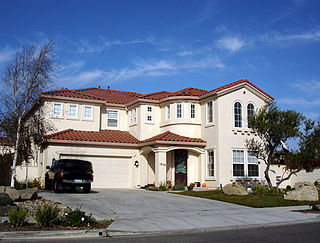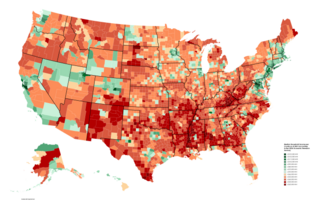
Redlining is a discriminatory practice in which services are withheld from potential customers who reside in neighborhoods classified as "hazardous" to investment; these neighborhoods have significant numbers of racial and ethnic minorities, and low-income residents. While the best-known examples involve denial of credit and insurance, also sometimes attributed to redlining in many instances are denial of healthcare and the development of food deserts in minority neighborhoods. In the case of retail businesses like supermarkets, the purposeful construction of stores impractically far away from targeted residents results in a redlining effect.

Wealth is the abundance of valuable financial assets or physical possessions which can be converted into a form that can be used for transactions. This includes the core meaning as held in the originating Old English word weal, which is from an Indo-European word stem. The modern concept of wealth is of significance in all areas of economics, and clearly so for growth economics and development economics, yet the meaning of wealth is context-dependent. A person possessing a substantial net worth is known as wealthy. Net worth is defined as the current value of one's assets less liabilities.

A millionaire is an individual whose net worth or wealth is equal to or exceeds one million units of currency. Depending on the currency, a certain level of prestige is associated with being a millionaire. Many national currencies have, or have had at various times, a low unit value, in many cases due to past inflation. It is obviously much easier and less significant to be a millionaire in those currencies, thus a millionaire in Hong Kong or Taiwan, for example, may be merely averagely wealthy, or perhaps less wealthy than average. A millionaire in Zimbabwe in 2007 could have been extremely poor. Because of this, the term 'millionaire' generally refers to those whose assets total at least one million units of a high-value currency, such as the United States dollar, euro, or pound sterling.

The distribution of wealth is a comparison of the wealth of various members or groups in a society. It shows one aspect of economic inequality or economic heterogeneity.
A wealth tax is a tax on an entity's holdings of assets or an entity's net worth. This includes the total value of personal assets, including cash, bank deposits, real estate, assets in insurance and pension plans, ownership of unincorporated businesses, financial securities, and personal trusts. Typically, wealth taxation often involves the exclusion of an individual's liabilities, such as mortgages and other debts, from their total assets. Accordingly, this type of taxation is frequently denoted as a netwealth tax.
Greenwood is a historic freedom colony in Tulsa, Oklahoma. As one of the most prominent concentrations of African-American businesses in the United States during the early 20th century, it was popularly known as America's "Black Wall Street". It was burned to the ground in the Tulsa race massacre of 1921, in which a local white mob gathered and attacked the area. Between 75 and 300 Americans were killed, hundreds more were injured, and the homes of 5000 were destroyed, leaving them homeless. The massacre was one of the largest in the history of U.S. race relations, destroying the once-thriving Greenwood community.
High-net-worth individual (HNWI) is a term used by some segments of the financial services industry to designate persons whose investible wealth exceeds a given amount. Typically, these individuals are defined as holding financial assets with a value greater than US$1 million. "Very-HNWI" (VHNWI) can refer to someone with a net worth of at least US$5 million. As of December 2022, there were estimated to be just over 15 million HNWIs in the world according to the World's Wealthiest Cities Report 2023 by Henley & Partners. The United States had the highest number of HNWIs of any country, whilst New York is the wealthiest city with 340,000 HNWIs.

Wealth management (WM) or wealth management advisory (WMA) is an investment advisory service that provides financial management and wealth advisory services to a wide array of clients ranging from affluent to high-net-worth (HNW) and ultra-high-net-worth (UHNW) individuals and families. It is a discipline which incorporates structuring and planning wealth to assist in growing, preserving, and protecting wealth, whilst passing it onto the family in a tax-efficient manner and in accordance with their wishes. Wealth management brings together tax planning, wealth protection, estate planning, succession planning, and family governance.

The Millionaire Next Door: The Surprising Secrets of America's Wealthy (ISBN 0-671-01520-6) is a 1996 book by Thomas J. Stanley and William D. Danko. The book is a compilation of research done by the two authors in the profiles of American millionaires.
In marketing and financial services, mass affluent and emerging affluent are the high end of the mass market, or individuals with US$100,000 to US$1,000,000 of liquid financial assets plus an annual household income over US$75,000.
The American upper class is a social group within the United States consisting of people who have the highest social rank, primarily due to economic wealth. The American upper class is distinguished from the rest of the population due to the fact that its primary source of income consists of assets, investments, and capital gains rather than wages and salaries. The American upper class is estimated to include 1–2% of the population.
The African-American middle class consists of African-Americans who have middle-class status within the American class structure. It is a societal level within the African-American community that primarily began to develop in the early 1960s, when the ongoing Civil Rights Movement led to the outlawing of de jure racial segregation. The African American middle class exists throughout the United States, particularly in the Northeast and in the South, with the largest contiguous majority black middle-class neighborhoods being in the Washington, DC suburbs in Maryland. The African American middle class is also prevalent in the Atlanta, Charlotte, Houston, Dallas, New York, San Antonio and Chicago areas.
An individual development account (IDA) is an asset building tool designed to enable low-income families to save towards a targeted amount usually used for building assets in the form of home ownership, post-secondary education and small business ownership. In principle IDAs work as matched savings accounts that supplement the savings of low-income households with matching funds drawn from a variety of private and public sources.

Affluence refers to an individual's or household's economical and financial advantage in comparison to others. It may be assessed through either income or wealth.

The inequality of wealth has substantially increased in the United States in recent decades. Wealth commonly includes the values of any homes, automobiles, personal valuables, businesses, savings, and investments, as well as any associated debts.
Asset poverty is an economic and social condition that is more persistent and prevalent than income poverty. It is a household’s inability to access wealth resources that are sufficient to provide for basic needs for a period of three months. Basic needs refer to the minimum standards for consumption and acceptable needs. Wealth resources consist of home ownership, other real estate, net value of farm and business assets, stocks, checking and savings accounts, and other savings. Wealth is measured in three forms: net worth, net worth minus home equity, and liquid assets. Net worth consists of all the aspects mentioned above. Net worth minus home equity is the same except it does not include home ownership in asset calculations. Liquid assets are resources that are readily available such as cash, checking and savings accounts, stocks, and other sources of savings. There are two types of assets: tangible and intangible. Tangible assets most closely resemble liquid assets in that they include stocks, bonds, property, natural resources, and hard assets not in the form of real estate. Intangible assets are simply the access to credit, social capital, cultural capital, political capital, and human capital.
In the United States, housing segregation is the practice of denying African Americans and other minority groups equal access to housing through the process of misinformation, denial of realty and financing services, and racial steering. Housing policy in the United States has influenced housing segregation trends throughout history. Key legislation include the National Housing Act of 1934, the G.I. Bill, and the Fair Housing Act. Factors such as socioeconomic status, spatial assimilation, and immigration contribute to perpetuating housing segregation. The effects of housing segregation include relocation, unequal living standards, and poverty. However, there have been initiatives to combat housing segregation, such as the Section 8 housing program.
In the United States, despite the efforts of equality proponents, income inequality persists among races and ethnicities. Asian Americans have the highest median income, followed by White Americans, Hispanic Americans, African Americans, and Native Americans. A variety of explanations for these differences have been proposed—such as differing access to education, two parent home family structure, high school dropout rates and experience of discrimination and deep-seated and systemic anti-Black racism—and the topic is highly controversial.
In the United States, racial inequality refers to the social inequality and advantages and disparities that affect different races. These can also be seen as a result of historic oppression, inequality of inheritance, or racism and prejudice, especially against minority groups.

In the US, Black-owned businesses, also known as African American businesses, originated in the days of slavery before 1865. Emancipation and civil rights permitted businessmen to operate inside the American legal structure starting in the Reconstruction Era (1863–77) and afterwards. By the 1890s, thousands of small business operations had opened in urban areas. The most rapid growth came in the early 20th century, as the increasingly rigid Jim Crow system of segregation moved urban Blacks into a community large enough to support a business establishment. The National Negro Business League—which Booker T. Washington, college president, promoted—opened over 600 chapters. It reached every city with a significant Black population.









